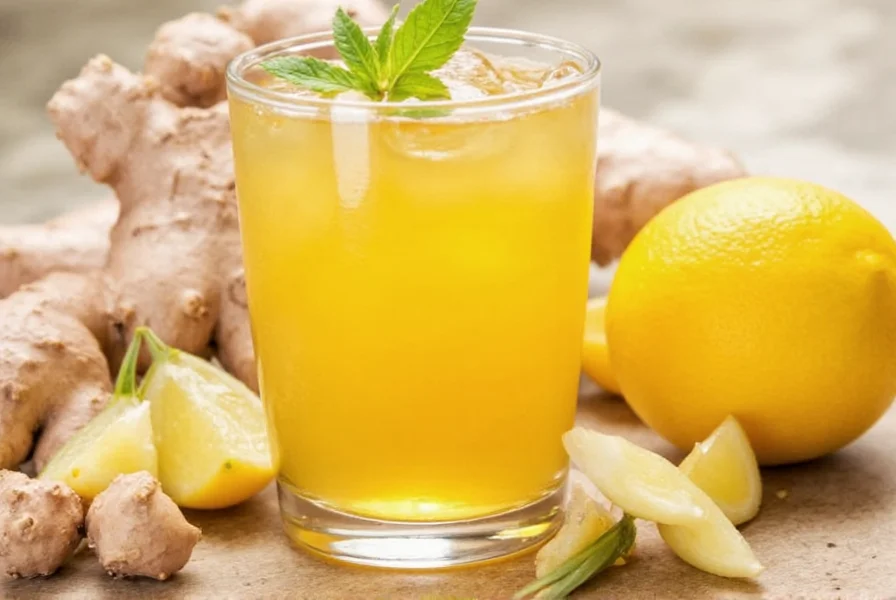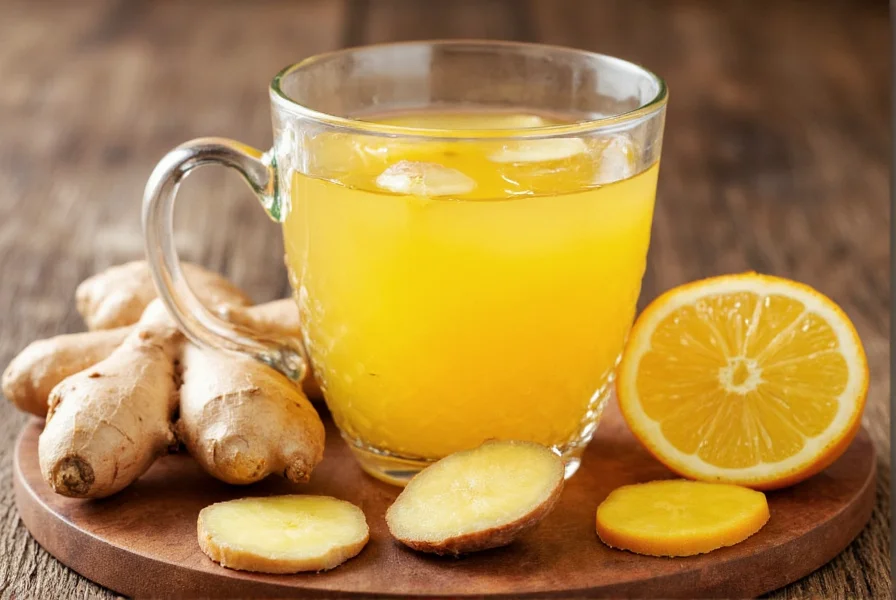The most common drinks with ginger include ginger tea, ginger ale, ginger beer, golden milk with ginger, and ginger-infused lemonades. These beverages range from traditional medicinal teas to modern craft beverages, offering various health benefits and flavor profiles. Fresh ginger root is the key ingredient that provides the distinctive spicy, warming taste and potential wellness properties. Whether you're seeking digestive support, immune system benefits, or simply a flavorful non-alcoholic option, ginger beverages deliver versatile hydration with functional properties.
Ginger has been used for centuries across multiple cultures for both culinary and wellness purposes. This rhizome's unique combination of zesty flavor and bioactive compounds makes it an exceptional ingredient for beverages. The primary compound responsible for ginger's characteristic heat and many of its studied properties is gingerol, which transforms into zingerone and shogaols when heated or dried, creating different flavor profiles for various drink preparations.
Traditional Ginger Beverages Around the World
Ginger's global journey has resulted in diverse traditional preparations that showcase regional preferences and cultural significance. These time-tested recipes often combine ginger with other locally available ingredients to create distinctive flavor profiles and targeted wellness benefits.
| Traditional Ginger Drink | Origin | Key Ingredients | Preparation Method |
|---|---|---|---|
| Saenggang-cha | Korea | Fresh ginger, honey or sugar | Thinly sliced ginger simmered for 30-60 minutes |
| Tukuma | Nigeria | Ginger, hibiscus, pineapple | Boiled mixture served chilled |
| Adrak Wali Chai | India | Ginger, black tea, milk, spices | Simmered with tea leaves and spices |
| Caribbean Ginger Beer | Caribbean | Ginger, sugar, yeast, lime | Fermented for natural carbonation |
Health Benefits of Ginger Beverages
While not intended as medical advice, research suggests ginger beverages may support digestive health, reduce inflammation, and provide antioxidant benefits. The bioactive compounds in ginger, particularly gingerols and shogaols, have been studied for their potential effects on nausea relief, particularly for morning sickness and motion sickness. Many people find ginger tea for digestion particularly effective when consumed after meals.
When preparing ginger drinks for potential wellness benefits, the preparation method affects the bioactive compounds present. Longer simmering times increase the conversion of gingerols to shogaols, which are more stable compounds with different properties. For maximum gingerol content, steep fresh ginger in hot (not boiling) water for 5-10 minutes. For stronger anti-nausea effects, longer simmering (20-30 minutes) creates more shogaols.

Modern Ginger Beverage Variations
Contemporary interpretations of ginger drinks blend traditional wisdom with modern flavor preferences. These creative adaptations maintain ginger's functional properties while appealing to diverse palates and dietary preferences.
Golden Milk with Ginger
This turmeric-based beverage gains additional depth and digestive benefits from ginger. A typical recipe combines 1 cup of milk (dairy or plant-based), 1/2 teaspoon turmeric, 1/4 teaspoon freshly grated ginger, a pinch of black pepper, and a natural sweetener. Simmer gently for 10 minutes without boiling. The black pepper enhances curcumin absorption from turmeric, while ginger complements the anti-inflammatory profile.
Ginger-Lemon Hydration Elixir
A simple yet effective combination for daily hydration, this drink merges ginger's warmth with lemon's brightness. Combine 1-2 tablespoons of freshly squeezed lemon juice with 1-2 teaspoons of grated ginger in 8 ounces of warm water. Add honey to taste if desired. This homemade ginger lemonade recipe provides vitamin C alongside ginger's bioactive compounds for comprehensive wellness support.
Creating Perfect Ginger Beverages at Home
The quality of your ginger drink depends significantly on ingredient selection and preparation technique. Understanding how to work with ginger ensures optimal flavor and potential benefits in your beverages.
Selecting and Preparing Ginger
Choose firm, smooth ginger roots with tight skin and minimal wrinkles. Younger ginger has thinner skin and more moisture, making it ideal for juicing and fresh preparations. Older ginger has a stronger flavor and is better for simmering. Always wash and scrub ginger thoroughly before use—peeling is optional as most beneficial compounds reside near the skin.
Basic Ginger Syrup Recipe
Create a versatile base for multiple ginger beverages with this simple syrup:
- Peel and slice 1 cup of fresh ginger
- Add to 2 cups water and 2 cups sugar
- Simmer covered for 20 minutes
- Cool and strain
- Store in refrigerator for up to 2 weeks
This ginger simple syrup serves as the foundation for homemade ginger ale, cocktails, and flavored sparkling water. For stronger ginger flavor in your ginger drinks for immunity, extend simmering time to 30-40 minutes.
When to Use Fresh vs. Dried Ginger
Fresh ginger provides a brighter, more complex flavor profile with higher gingerol content, making it ideal for teas and beverages where you want pronounced ginger character. Dried ginger powder works well in spice blends and certain baking applications but lacks the nuanced flavor of fresh ginger in beverages.
For traditional ginger tea preparation, fresh ginger delivers superior results. Grate or thinly slice the ginger to maximize surface area for extraction. The optimal ratio is 1-2 teaspoons of grated ginger per 8 ounces of water. Adjust to taste based on your preference for stronger or milder ginger flavor in drinks.
Frequently Asked Questions
What's the difference between ginger ale and ginger beer?
Traditional ginger beer is fermented using a ginger beer plant (a symbiotic culture), resulting in natural carbonation and a more complex, spicy flavor. Most commercial ginger ales are simply carbonated water flavored with ginger extract and sweeteners, lacking the depth and potential probiotic benefits of traditionally fermented ginger beer.
How much ginger should I use for digestive benefits in drinks?
For digestive support, use 1-2 teaspoons of freshly grated ginger per 8 ounces of water. Simmer for 10-15 minutes to extract beneficial compounds without making the drink overly spicy. Consuming ginger tea for digestion about 20 minutes before meals may help prepare your digestive system.
Can I make ginger drinks without sugar?
Yes, many ginger beverages work well without added sweeteners. Fresh ginger's natural pungency provides sufficient flavor, especially when combined with citrus like lemon or lime. For those preferring sweetness, consider small amounts of honey, maple syrup, or stevia as alternatives to refined sugar in homemade ginger drinks.
How long does homemade ginger syrup last?
Properly stored in a clean glass container in the refrigerator, homemade ginger simple syrup maintains quality for 2-3 weeks. For extended storage, freeze in ice cube trays then transfer to freezer bags. This ginger syrup preservation method allows you to have ginger flavor available for drinks year-round.
Is there an optimal time to drink ginger beverages?
Morning is often considered ideal for ginger drinks as the warming properties can help stimulate digestion and provide gentle energy. However, ginger tea before bed may help with relaxation for some people. Avoid consuming strong ginger beverages on an empty stomach if you have sensitivity, as the spiciness might cause discomfort.











 浙公网安备
33010002000092号
浙公网安备
33010002000092号 浙B2-20120091-4
浙B2-20120091-4